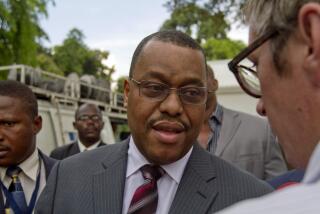Politics, Rivalries Cloud Search for U.N. Leader
- Share via
UNITED NATIONS — The process of choosing the next U.N. secretary-general intensified Tuesday amid signs that the selection has become enmeshed in African politics and French and American rivalries.
The 15-member Security Council began sorting through the four official candidates, all Africans, in secret, informal ballots.
Kofi Annan, 58, a veteran of the U.N. bureaucracy who now is undersecretary-general for peacekeeping operations, emerged as the front runner, with the backing of 10 council members.
But among the four votes against Annan--there was one abstention--was one of the council’s five veto-wielding permanent members. It was not officially disclosed which country, but it was believed to be France.
The French are said to be backing Amara Essy, 51, foreign minister of Ivory Coast, a former French colony.
France alone could doom Annan’s candidacy, just as the United States, another permanent member, vetoed the reelection of incumbent Boutros Boutros-Ghali on Nov. 16.
Essy, meanwhile, received only seven affirmatives in the informal balloting and was opposed by two permanent members, probably the United States and Britain.
The two other candidates--Hamid Algabid of Niger and Ahmedou Ould Abdallah of Mauritania--received five and three affirmative votes, respectively.
Under the arcane U.N. system, council members can vote for more than one person in the informal balloting, which is intended to narrow the field. Voting resumes today.
Diplomats say campaigning for the post has intensified, with France seeking to assert its leadership and assure that the next secretary-general comes from a French-speaking African nation.
The French, who sponsored Boutros-Ghali, 74, in 1991, are among the U.N. members most angered by the U.S. decision to veto a second term for the Egyptian.
“This is now about Big Power politics in Africa,” one council member said after the balloting Tuesday.
France regards Africa as an area where it has special influence, though it has waned.
When the French tried to marshal support for U.N. intervention in the recent refugee crisis in eastern Zaire and Rwanda, for example, they were repudiated by the Rwandan government and had to hand leadership of the effort over to Canada.
The United States, meanwhile, is seen as quietly backing Annan. Resentment against the American veto of Boutros-Ghali is so widespread that the U.S. cannot openly support any candidate without assuring his defeat.
If today’s polling identifies a likely winner, that candidate would go to an official council vote. If not, other candidates could be nominated and the consensus to limit the field to Africans might break down.
To win, a candidate must receive nine affirmative votes and not be opposed by any of the permanent five members--China, Russia, the United States, Britain and France. The 185-member General Assembly then ratifies the choice.
Annan, a Ghanaian, is well-known, liked and respected at the U.N. He speaks English and can work in French; English is the official language of Ghana, a former British colony.
One U.N. official suggested that Annan’s biggest handicap is that he has mainly been an international civil servant who has never represented Africa in the world body, raising questions whether African diplomats would consider him their best candidate.
African politics have also influenced the potential candidacy of Olara A. Otunnu, president of the International Peace Academy, a New York-based think tank.
He is regarded by some as a strong candidate but has been unable to find a country willing to nominate him. He was born in Uganda but is estranged from the current government and has changed his citizenship to Ivory Coast--which is supporting Essy, its foreign minister.
One ambassador suggested Tuesday that Otunnu could emerge as a compromise candidate if Annan and Essy cancel each other out.
While some see the secretary-general selection process as being akin to the Roman Catholic cardinals electing a pope, critics complain that a key, sensitive diplomatic post is filled with less public scrutiny and sober deliberation than is given to the choosing of a small-town U.S. mayor.
Five years ago, Boutros-Ghali campaigned for the job by airline-hopping from one global capital to another, promising, among other things, that he would serve one term.
This year, campaigning has been more subtle: a few words from one ambassador to another over a cup of espresso or a bottle of mineral water in the delegates’ lounge; a discreet reminder by one delegate to another of past favors.
About the most flamboyant act among serious candidates so far was the decision by Algabid of Niger to circulate his resume last summer at a summit of the Organization of African Unity.
More to Read
Sign up for Essential California
The most important California stories and recommendations in your inbox every morning.
You may occasionally receive promotional content from the Los Angeles Times.










